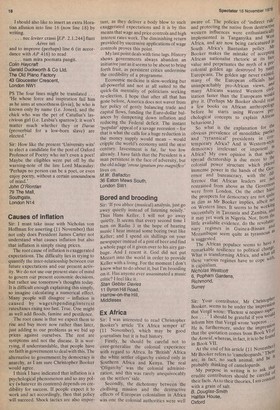Causes of inflation
Sir: I must take issue with Nicholas von Hoffman for asserting (11 November) that not only does President James Carter not understand what causes inflation but also that inflation is simply rising prices.
The root cause of inflation is exaggerated expectations. The difficulty lies in trying to quantify the inter-relationship between our future expectations and our present activity. We do not use our present state of mind to govern our present economic decisions, but rather use tomorrow's thoughts today. It is difficult enough explaining this simply, so imagine calculating a numerical effect. Many people will disagree — inflation is caused by wages/spending/interest rates/taxes rising too fast. True. One might as well add floods, famine and pestilence.
The root cause is that we expect them to rise and buy more now rather than later, just adding to our problems as we bid up prices against ourselves. The rest are symptoms and not the disease. It is worrying, if understandable, that people have no faith in government to deal with this. The alternative to government by democracy is anarchy, as I am sure Christopher Booker would agree.
I think I have indicated that inflation is a psychological phenomenon and so any policy (whatever its contents) depends on credibility for success. If people expect it to work and act accordingly, then that policy will succeed. Shock tactics are also impor tant, as they deliver a body blow to such exaggerated expectations and it is by this means that wage and price controls and high interest rates work. The diminishing return provided by successive applications of wage controls proves this point.
My last point deals with time lags. History shows governments always abandon an initiative just as it seems to be about to bring forth fruit, as persistent critics undermine the credibility of a programme.
Economic medicine is slow-working but all-powerful and not at all suited to the quick-fix mentality of politicians seeking re-election. I hope that after all that has gone before, America does not waver from her policy of gently balancing trade and capital flows, funding the Euro-dollar balances by dampening down inflation and reducing the Federal deficit. The instant 'popular' appeal of a savage recession — for that is what the calls for a huge reduction in the money supply would mean — would cripple the world's economy until the next century. Investment is far, far too low already. I have faith that the President is a man persistent in the face of adversity, but the old adage `omne ignatum pro magnifico' lives on.
M.W. Balladon 36 Eaton Mews South, London SW1


































 Previous page
Previous page